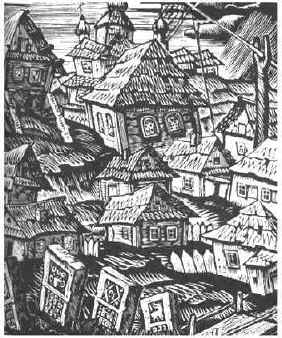"Something Special In Our Connection With European Yiddishkayt"
A Yid commenting on A New Generation Of Chassidim:
I think this issue is much more sharp in relation to baaley tshuvo. Those who were raised frum have their "baggage" from birth. They grew up and developed certain way. What should a baal tshuvo do, who "came from the Moon"? He has to learn many things (dinim and halochoys, yesoydoys hoemuno and etc.) to become one who adheres to the Toyro. Very often one has to start when he is already an adult. But is it enough? What should he do with these "trimmings" how you call them? To say that Chasidus is above everything is a nice abstract idea, but it doesn't help in the least with this issue for those who don't have any "baggage" from before altogether! That's why I think there is something special in our connection with European Yiddishkayt. Baal tshuvo can't change himself according to Bovel etc. So this comparison is not so correct. Right - all traditions are heylik, the one which was in Bovel as well. But our grandfathers and great grandfathers are much closer to us, than our ancestors from Bovel.
Some fail to change fail these things altogether - they do learn, they do mitzvoys, but their "trimmings" are basically the same as before. Others change them as well, because the feel a deeper connection to Yiddishkayt in this way. But how can they be changed, or better to ask to what? That's where this issue is coming out in full force.










5 Comments:
There is a typo in the posting. Please change the phrase in the second paragraph to "Some fail to change these things..."
A Yid:
Also "baaley tshuvo" is misspelled in the first sentence.
I understand where you are coming from very well. And maybe the so-called "trimmings" have some ruchniyus qualities that make them more than just trimmings.
But knowing CE, I can also understand where he is coming from. He feels that the ikkar and tofel tend to get reversed in the thinking of many people in the "heimishe" world, and that the vitality of amoliger Chassidus has been crushed by the katnus that affects certain kehillos.
The fact is that we are not culturally the same as our Eastern European zeides and bubbes, and that things have already changed greatly here in America and in modern Eretz Yisrael. CE probably rankles at the idea of trying to be something that he's not, and that none of are: carbon copies of that baal tefiloh from Kharkov (or Uman or Nevel or Krakow or Sighet, etc.).
The great challenge is to preserve the spirit and inspiration of Chassidus of the past and at the same time be who we are in the world we live in today... a tall order!
> The fact is that we are not culturally the same as our Eastern European
> zeides and bubbes, and that things have already changed greatly here in
> America and in modern Eretz Yisrael.
That's exactly what I'm talking about. Since a baal tshuvo is changing his life already, he can feel more connected to do it according to those zeides and bobes (to the best of one's ability), rather than according to today American / Eretz Yisroel "updated" and "trimmed" Yidishkayt. Therefore this issue has different nuances for a baal tshuvo and one who is raised frum, who usually doesn't encounter a need for such deep change.
> CE probably rankles at the idea of trying to be something that he's not
That's perfectly understandable. While for a baal tshuvo he has to become someone who he wasn't before in a sense. That's why it can be different.
I saw your posting.
Definitely kiruv has its potential problems that have to be addressed. But statement that "most chassidic groups view the kiruv movement with suspicion" is not speaking in their favor, because they ignore the basic teachings of the Baal Shem Tov, which they seemingly "forgot". The problems in kiruv don't mean that it has to be avoided. This is pure anti Baal Shem Tov. They have to be addressed. You are right, that many don't change enough internally. External change is a smallest part, while internal one has to be the main. Here is apparent the immense lack of real chasidic yeshivoys for baaley tshuvo. Who makes them except Chabad, which today is in total chaos and strongly shifted to "modern style"?! Litvaks in Oyr Someyach are thoroughly misnagdic. And that approach can't teach the depth of Yiddihkayt by any means.
The only one such yeshiva was opened recently - "Derech haMelech". Let's hope this beginning will encourage others to work on this.
Post a Comment
<< Home